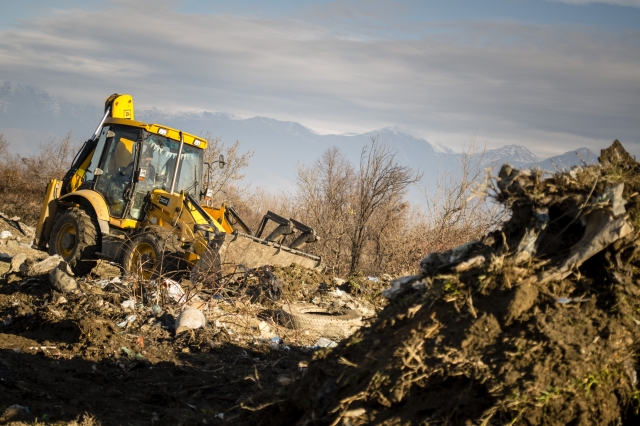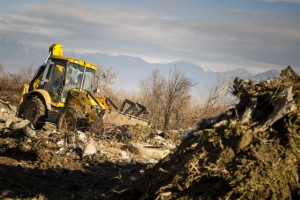WMTR Cleans Up and Repurposes Illegal Dumpsites
Aiming for a better environment and human health and waste management system in the country, the Waste Management Technologies in the Regions (WMTR) Program, together with the municipalities of its targeted regions of Kakheti and the Autonomous Republic of Adjara, started clean-up campaigns of illegal dumpsites.
A dumpsite covering 1 ha of land in Akura village, Kakheti region, was cleaned by the WMTR team and Telavi Municipality on January 5–7, from which 50 m3 of waste was removed. The land served as a dumpsite for about 350 households in the village, so the Municipal Council installed bins last year, and the population has since stopped disposing of waste here.
The area is located near the village’s agricultural land, where the population harvests corn and has vineyards. Additionally, the inhabitants shepherd cattle and collect blackberries. Also, the area has an irrigation channel that runs through it with contaminated water.
Like the Akura clean-up campaign, other illegal dumpsites in six villages of both regions have also been cleaned. Sites in three villages of Akhmeta municipality, Duisi, Dumasturi and Khalatsani, covering an area of around 2 hectares were cleaned and repurposed as a forest with 300 walnut trees provided by the Austrian Development Cooperation-funded Sustainable Forest Management in Georgia (SFG) and implemented by Caucasus Environmental NGO Network (CENN) in the middle of November last year.
Those areas located along the bank of the river Alazani served as a household waste dumpsite for many years and had spread all over the bank of the river. Bottles, plastic bags, and sheep wool were the most common materials at the dumpsites, along with other household waste that created a threat to the environment and human health. Moreover, besides being an illegal landfill, it is also being used for grazing and poultry. During the heavy rainfall, it is likely that the waste was washed into the river.
During the cleaning campaigns, twenty three 700-liter waste bins and an information board were installed in both areas in order to prevent future pollution. A regular waste collection service was arranged by the municipalities with the help of the WMTR Team.
Additionally, in the WMTR program, in cooperation with local governments, three areas in the villages of Dekanishvilebi, Tsetskhlauri and Legva (located in the Autonomous Republic of Adjara) were cleaned in September-October last year. The total area of dumpsites in the villages of Tsetskhlauri and Legva was 200-250 m2, while the area in Dekanishvilebi was 250 m2. The areas were repurposed as forests with trees provided by the Adjara Forestry Agency and the CENN/ADA forestry project.
In the very near future, the team plans on cleaning a site in Apeni village in Lagodekhi municipality, where “grove oak” (Quercus Longipes), featured on the Red List of endangered species of Georgia, will be planted in the cleaned area.
The WMTR Program, implemented by the International City/Country Management Association (ICMA) and the Caucasus Environmental NGO Network (CENN) and financed by the US Agency for International Development (USAID), assists central and local governments, local businesses, communities and municipalities in developing integrated waste management systems for its targeted regions - Kakheti and Adjara.












